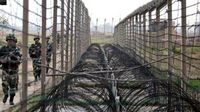In the wake of the deadly terror attack in Pahalgam that claimed the lives of 26 innocent civilians on April 22, tensions between India and Pakistan have reached a new high. The brutal incident, which took place in Jammu and Kashmir, has triggered heightened security responses across the nation. Taking serious note of the escalating threat, the Ministry of Home Affairs (MHA) has issued directives to several states, urging them to conduct large-scale civil defence mock drills on May 7. These drills are aimed at assessing the country's preparedness in case of a hostile attack and at the same time raising awareness among the public.
Meanwhile, United Nations Secretary General Antonio Guterres has called for "maximum restraint," saying that a "military solution is no solution." Condemning the attack, Guterres expressed grief over the relation between both countries reaching to a "boiling" point.
As preparations ramp up for the nationwide mock drill, various regions are gearing up to participate. Rajasthan's Jaisalmer District Magistrate Pratap Singh Nathawat stated that all civil defence teams and emergency services are fully prepared for the drill. In Uttar Pradesh, civil defence mock drills are already underway at Thompson Ground in Gonda, with heightened security alerts in place.
Additionally, India has issued a Notice to Airmen (NOTAM) for a large-scale air exercise along the southern Indo-Pak border, further signaling heightened military readiness amid rising tensions. This exercise is set to take place on May 7-8, coinciding with the mock drills designed to test the nation's emergency response capabilities.
In Mumbai, preparations are underway for a civil defence mock drill at Chhatrapati Shivaji Maharaj Terminus. The Railway Protection Force (RPF), aided by sniffer dogs and advanced equipment, conducted a mock drill to assess emergency preparedness. Similarly, security measures have been intensified in Connaught Place, a major commercial hub in Delhi, following directions from the MHA.
Amid these preparations, Prime Minister Shehbaz Sharif of Pakistan visited the ISI headquarters for a briefing on the national security situation. In India, the Parliamentary Committee on Defence is scheduled to hold a series of meetings across various cities, starting May 9, to discuss security measures in light of the recent escalation.
As part of the nationwide exercise, war sirens will sound across multiple cities in Uttar Pradesh, signaling heightened preparedness. Residents in Jammu and Kashmir are also preparing to take shelter in newly readied underground bunkers, a precautionary measure amid fears of potential conflict.
US House of Representatives Speaker Mike Johnson has expressed strong support for India in its fight against terrorism, stating that the US will do everything possible to assist. This sentiment reflects the growing international concern over the situation in the region.
On the ground, the Indian Army has begun restoring decades-old bunkers along the international border, a move aimed at reinforcing defensive measures. Meanwhile, in Punjab, a cache of terrorist hardware linked to ISI-backed networks has been recovered, highlighting ongoing security challenges.
As tensions continue to rise, the Indian government has taken decisive diplomatic actions, including suspending the Indus Waters Treaty, which regulates the sharing of water resources between the two nations. This suspension is expected to have significant implications for Pakistan, with forecasts indicating a potential 21% water shortage during the early Kharif season.
In a recent development, the UNSC held closed-door consultations regarding the Kashmir issue, where Pakistan's claims were met with skepticism. The council members raised sharp questions about the involvement of terror groups in the Pahalgam attack, asserting the need for accountability.
As preparations for the mock drills continue, officials across the country are emphasizing the importance of comprehensive readiness. Punjab Governor Gulab Chand Kataria stressed that every kind of preparation is necessary for national safety. "I believe preparing everything is necessary for the safety of the nation," he said.
In Delhi, security drills are scheduled to take place at 55 locations, simulating various emergency scenarios, including air raids and fire emergencies. Schools have also been instructed to conduct Civil Defence Awareness and Preparedness Programs to equip students with essential emergency response skills.
As the nation gears up for these exercises, the overarching goal remains clear: to enhance public safety and preparedness in the face of evolving threats. The upcoming drills will not only assess the effectiveness of warning systems but also train civilians on how to respond during emergencies.
The Pahalgam terror attack has underscored the urgency of these measures, and as the situation evolves, both India and Pakistan find themselves at a critical juncture, with the potential for further escalation looming large.
As the mock drills approach, the Indian government is committed to ensuring that the nation is well-prepared to respond to any eventuality, reinforcing the message that safety and vigilance remain paramount in these uncertain times.
Ultimately, the success of these drills will depend not only on the coordination of emergency services but also on the active participation of citizens, who play a crucial role in ensuring their own safety and that of their communities.


